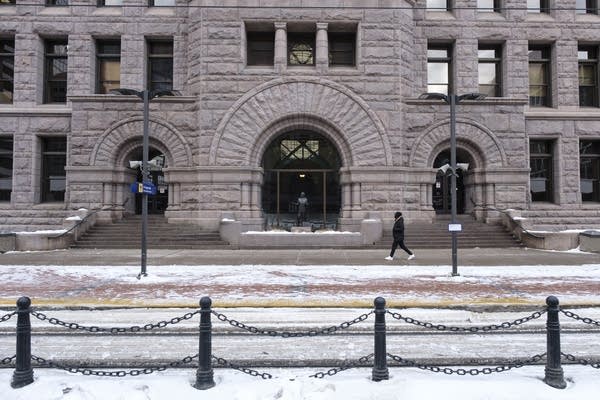Minneapolis City Council members offer dozens of changes to $1.8 billion budget
Amendments to budget include funding for more civilian-led public safety efforts

Go Deeper.
Create an account or log in to save stories.
Like this?
Thanks for liking this story! We have added it to a list of your favorite stories.
Updated 8:45 a.m.
Members of the Minneapolis City Council will offer proposed changes to the $1.8 billion city budget proposed by the mayor on Thursday. Many of the council members’ proposed amendments face opposition from Mayor Jacob Frey and members of his administration.
Minneapolis City Council members have unveiled four dozen amendments to the mayor's proposed budget, which already includes a focus on affordable housing and the city’s climate initiative.
It also covers some of the expected costs of the city’s court-enforced agreement with the Minnesota Department of Human Rights and another expected federal consent decree with the U.S. Department of Justice over the Minneapolis Police Department.
Council members were sent a memo on Wednesday outlining opposition to many of the amendments from Office of Community Safety Commissioner Todd Barnette and Interim City Operations Officer Heather Johnston.
Turn Up Your Support
MPR News helps you turn down the noise and build shared understanding. Turn up your support for this public resource and keep trusted journalism accessible to all.
Among the amendments that will be considered by council members is one that would create a pilot program to deploy public safety ambassadors through some parts of the city.
It would transfer $2.1 million in one-time state public safety aid to a pilot program to hire unarmed “ambassadors” to patrol the city’s seven cultural districts. The districts are areas that have suffered from historic redlining and divestment and are also home to residents from diverse racial or class backgrounds.
“The anticipated value of this pilot program will be delivered through increased capacity for the city’s Cultural Districts; coordinated service delivery; highly visible, unarmed, friendly safety presence; reduced calls for service to Minneapolis Police Department; and increased livability along the corridors,” according to the proposal.
The mayor’s cabinet said in response to this and other proposals utilizing the one-time state money that it’s not advisable to use one-time money to fund pilot programs and that instead the city’s Office of Community Safety should be given time to fill existing staff vacancies and bolster existing programs.
Earlier this month, the council voted to reject a proposal by the Frey administration to use more than $15 million of one-time state money to pay for incentives for police officer recruitment and retention.
In a letter to council members issued last night, Mayor Frey reiterated his disapproval of the council’s decision to reject the officer incentives proposal. And he was critical of amendments which remove full-time positions from the department charged with implementing a public safety plan outlined in the Minneapolis Safe and Thriving Communities Report released earlier this year.
“But if this money is to be used for a different purpose, I strongly suggest that you get buy-in from the people charged with implementing the work,” wrote Frey. “Promising new pilots from the Council dais without input from our expert staff could result in empty promises.”
Council members did not propose to spend all of that state money.
An amendment authored by Council Member Emily Koski would reserve $9.6 million in the city’s public safety aid from the state for future uses.
Council members will also consider other amendments that invest in neighborhood safety, including a proposal that would decrease the budget for the city’s human resources department and fund domestic violence navigators.
Another proposal; would provide $500,000 to create an interim community safety center in the city’s 3rd Precinct while a new precinct is being built.
“An interim Safety Center in the 3rd precinct provides a place for residents to file police reports and get information. It will also provide residents the opportunity to connect with law enforcement and non-law enforcement functions within the city,” according to the proposal.
The mayor’s cabinet said the interim location wasn’t necessary and strongly recommended against it. They said the new 3rd Precinct Community Safety Center could feasibly be operating sometime in 2024.
Among the amendments proposed by council members are some that would add staffing to the council, including legislative analysts, communications staff and staffers assigned to the council’s leadership.
Council members have argued that the new executive mayor and legislative council system in the city requires them to have more independent staffers.
Another proposal would allocate money to cover the costs of sidewalk snow and ice removal pilots in the city.
In their response, the mayor’s cabinet notes that “the department’s snow budget has overspent the last 5 years due to winter conditions” and that earmarking money could lead to more overspending.
An amendment by Council Members Robin Wonsley and Jeremiah Ellison would add funding for the city’s Open Streets gatherings, which the mayor’s cabinet said in their response was unnecessary because they will work with the city’s public works department to ensure the program continues without the added funding.
The council has scheduled budget hearings to make changes starting this week and is expected to pass a final budget in mid-December. The budget the council passes will be submitted to the mayor for approval.
Dear reader,
Political debates with family or friends can get heated. But what if there was a way to handle them better?
You can learn how to have civil political conversations with our new e-book!
Download our free e-book, Talking Sense: Have Hard Political Conversations, Better, and learn how to talk without the tension.



